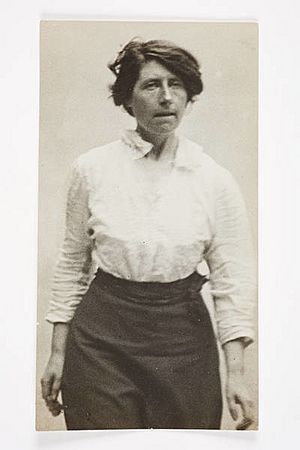Margaret Skirving Gibb facts for kids
Quick facts for kids
Margaret Skirving Gibb
|
|
|---|---|
 |
|
| Born | 1877 Glasgow, Scotland
|
| Died | 1954 (aged 76–77) Prestwick, South Ayrshire, Scotland
|
| Known for | Suffrage activism & chess |
Margaret Skirving Gibb (1877–1954) was a Scottish suffragette and a skilled chess player. A suffragette was a woman who actively campaigned for the right to vote. Margaret was involved in many activities to help women get the vote. This included a protest at a famous art gallery in 1914.
Fighting for Women's Right to Vote
Margaret Gibb strongly believed that women should have the same voting rights as men. In 1911, she and her family refused to take part in the national census. This was a way for them to protest against women not being allowed to vote.
In March 1914, Margaret was involved in another protest. She was sentenced to two months in Holloway prison for her actions.
Later in 1914, a very important leader of the suffragette movement, Emmeline Pankhurst, was arrested again. To protest this, Margaret Gibb went to the National Portrait Gallery. There, she took part in a protest involving a portrait of Thomas Carlyle. She was sentenced to six months in prison for this act. During this time, she sometimes used the name Ann Hunt. The portrait was put back on display about 100 years later. After this event, security was made tighter for women entering the gallery.
Margaret was one of many suffragettes who were secretly photographed by Scotland Yard. This happened from 1913 onwards. These photos helped identify suffragettes who might try to protest or damage things in public buildings.
Her Family and Life
Margaret Gibb was born and died in Prestwick, a town in South Ayrshire, Scotland. Her father, Peter Walker Gibb, was a fish merchant. Her mother, also named Margaret Skirving, was very important in the world of chess. She started the Glasgow Ladies Chess Club in 1905. She was the president of this club until she passed away in 1918.
Margaret was one of six children. Her sister, Ellison Scotland Gibb, was also a suffragette. Both Margaret and Ellison received special awards called Hunger Strike medals. These medals honored suffragettes who went on hunger strike in prison to protest their treatment.
Her Chess Career
Margaret Gibb was also a talented chess player. In 1923, she and her sister played for the Glasgow Ladies' team. Their team did very well, reaching the final of the Spens Cup in the 1922-23 season. This shows that Margaret was not only a brave activist but also a skilled sportswoman.

